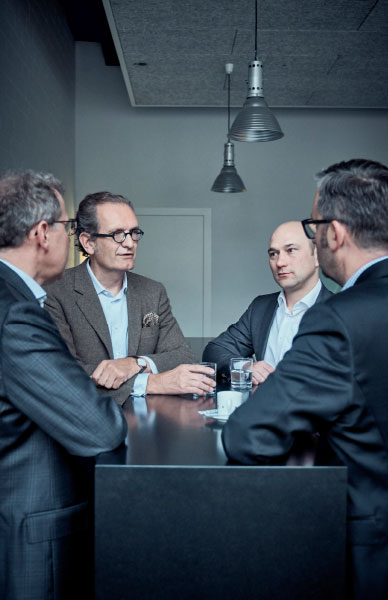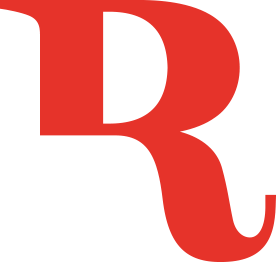Interview Group Management
The IPO brought in significant funds for further growth in the Zur Rose Group. At the same time strong signals were sent in Germany with intensified marketing activities and acquisitions. In Switzerland the mail-order pharmacy is attracting particular attention with shops.
Moderator: Medard Meier
The financial year 2017 was very eventful for the Zur Rose Group.
What was the personal highlight for you?
Walter Oberhänsli — That question is easy to answer: the IPO! It has been in our minds for quite some time. After the European Court ruled against the distortion of competition to the detriment of discounting of drug sales by foreign providers in October 2016, we started to make preparations. The time window on the stock exchange was favorable. To the delight of everyone, the IPO was a complete success.
Marcel Ziwica — For the Head of Finance an IPO is about the biggest thing that you can do in your career. So, the stock market flotation was an absolute highlight. The balance sheet situation changed for the better at a stroke. The Zur Rose Group is now fully self-financed.
How much new funding was available to you?
Ziwica — It amounted to 215 million Swiss francs net, which we are using according to our announced plans in the context of the growth strategy: for organic growth in Germany, for acquisitions, two of which have now been completed, for internationalization and for e-health. 50 million were used for redemption of the bond, by means of which we created new funding potential at the same time. Should any opportunities arise, we can now respond quickly and exploit them immediately.
Mr. Heinrich, what impact is the IPO having on the German business?
Olaf Heinrich — The IPO enables us to implement the growth strategy as we planned. For me the highlight was to see that a year after the ruling by the European Court, we returned to the growth path in prescription drugs that we had been on before the regulation which formed the basis for the ruling. This also shows that we are using the funds received through the stock exchange correctly and well on the market.
Mr. Hess, what was the eventful IPO year like for you, as Head of the operating segment Switzerland?
Walter Hess — The financial year was particularly shaped by the establishment of cooperative ventures with Migros, Medbase and some health insurance companies, but of course also by the IPO. The stock market flotation did of course bring us additional prominence and boosted our business.
How has business been?
Oberhänsli — We have been pursuing an ambitious growth strategy since 2016 and we are delighted that we have not only met the high targets but also surpassed them in some cases. This creates confidence for the new financial year because the growth must continue.
Hess — The Swiss segment has developed very positively. In the doctors’ segment, which is our core business area, we recorded growth rates which are considerably above those of the market. We are also very happy with the retail business. The cooperative ventures with the health insurance companies contributed to this, as did the Specialty Care business with expensive medications. The contributions from the new brick-and-mortar business are also a welcome addition.
Heinrich — DocMorris has grown as we had intended. Over the year we achieved 19% organic growth. In the OTC business the increase is significantly above 30 percent; for prescription drugs it is still in the low double-digit range.
The Group’s results are in the red, as envisaged. Did you expect the results to be closer to zero?
Ziwica — No, the year-end figures were entirely within the scope of our expectations. We deliberately invested in the markets. This is reflected in the marketing costs and in the results accordingly. The investments in the markets have been carefully controlled in order to acquire new customers. We are, however, already achieving profit contributions that we can be proud of.
When will you make it into the black?
Ziwica — The existing business areas and operational businesses will deliver positive results at EBITDA level. The seizing of new opportunities, the integration of the acquisitions and possible internationalization moves will once again result in liabilities for us, which will keep the results in the red in 2018.
Oberhänsli — We will continue to adhere to our approach of achieving growth through intensified marketing. We are thus quite prepared to accept being in the red. At a certain point in market penetration we will be able to reduce the marketing costs relative to sales, which will then put us into the black.
What are the expected market prospects, based on this assumption?
Hess — The growth in the supply of drugs will be maintained in Switzerland in the coming years. We expect to grow more strongly than the market. Consolidation will continue in the doctors’ wholesale business, which will be of benefit to us. The efforts of the regulator to bring down prices in the healthcare sector also favor our business model. The mail-order business would offer even greater potential for cost savings. However, this is still greatly underestimated by the politicians and actually prevented by regulation in some cases, as is shown by the OTC ruling.
What’s happening to the brick-and-mortar business, which you are also investing in? Is it already paying off?
Hess — Absolutely! This year we will be opening at least two more shop-in-shop pharmacies. The visibility and brand recognition of Zur Rose will be further enhanced as a result. Ultimately, we are aiming for cross-channel shopping and the associated greater convenience for the customers. Omni-channel is the keyword. And experience has shown us that it meets a need.
Oberhänsli — We’re living in a market where there is no price competition, because the chain pharmacies belong to the wholesalers. You work against cannibalization by keeping the price levels as high as possible. Our initiative to widen availability for the consumer through the brick-and-mortar trade is a promising approach, particularly as we operate with relevant discounts – in fact we are the only provider in Switzerland to do so. We see great disruptive potential in our strategy to change the Swiss market.
How rosy is the outlook in Germany?
Heinrich — We still see considerable growth potential in Germany. One major issue is the foreseeable consolidation in the OTC market, caused by intensified competition. We will be playing an active role. There are ongoing discussions about a mail-order ban on prescription drugs. However, a current report by the Federal Ministry for Economic Affairs and Energy confirms without doubt that the European Court was right in its assessment of the German pharmacy market and a ban on the mail-order business cannot be justified against the background of the comprehensive provision.
Oberhänsli — Based on legal opinions and statements by several Federal ministries and parties, I am convinced that a ban on mail-order Rx sales is in breach of the constitution and incompatible with European law. Against this background we are astonished that these rulings have not been adequately acknowledged and the intention of a ban has been included in the coalition agreement. We will therefore take all necessary legal and operational steps both in Germany and at the European level in the interest of the patients.
What do the acquisitions of Eurapon and Vitalsana mean for your business?
Heinrich — With those takeovers we demonstrated our active role in the shake-out of the market for the mail-order distribution of non-prescription drugs. This business represents a key pillar in our growth strategy. Eurapon, which has a very entrepreneurial management team, is already gaining market share. We can build on this strategy. With Vitalsana, we secured the last Dutch mail-order pharmacy with a relevant sales volume available on the market, and in doing so we raised the market entry barrier in the Netherlands. The media cooperation with former owner, Ströer, which we entered into at the same time, is enabling us to achieve Germany-wide visibility for the DocMorris brand. Developments make us very confident that we will be able to successfully exploit further market consolidation.
Keyword growth: Which main trends are also driving the business forward?
Oberhänsli — An ageing society which is reliant on drugs, the constantly rising cost pressure in the healthcare sector, as well as increasingly well-informed and aware consumers, will support the growth potential. Furthermore, digitization in the healthcare sector has lagged significantly behind other consumer goods industries. This can be seen in the considerably lower online penetration of the healthcare market.
Where do you see your opportunities with regard to digitization?
Hess — With the further expansion of our digital service portfolio we want to make further contributions to therapy compliance, to improve healthcare provision and to reduce the costs for the healthcare system and the insured persons. The use of smart data is also an important factor.
Heinrich — We expect e-health applications, platform solutions and a digital medications management system to play a key role in the German healthcare system in future. For that reason, DocMorris is developing step-by-step from a drugs retailer into a digital health advisor.
What are the targets for 2018?
Oberhänsli — Growth, growth, growth.
Hess — Expansion of our profitable base, the doctors’ segment, and growth in the retail business, including by expanding the cooperative ventures with the insurance companies, Medbase and Migros.
Heinrich — Organic growth, active participation in the market shake-out and integration of the companies we have acquired.
Ziwica — Digitization, new market entries and internationalization should set the pace. The real challenge will be to stay on the ball and to assert our position as leaders.

WALTER HESS (HEAD SWITZERLAND), WALTER OBERHÄNSLI (CEO), MARCEL ZIWICA (CFO), OLAF HEINRICH (HEAD GERMANY).
“We are delighted that we have not only met the high targets but also surpassed them in some cases.”
“In the doctors’ segment we recorded growth rates which are considerably above those of the market.”
“With the acquisitions, we demonstrated our active role in the shake-out of the market.“
